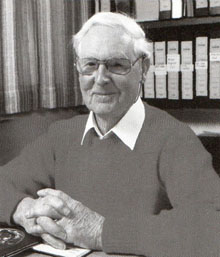
Sir Frank Macfarlane Burnet, usually known as Macfarlane or Mac Burnet, was an Australian virologist known for his contributions to immunology. He won a Nobel Prize in 1960 for predicting acquired immune tolerance and he developed the theory of clonal selection.

Frank John Fenner was an Australian scientist with a distinguished career in the field of virology. His two greatest achievements are cited as overseeing the eradication of smallpox, and the attempted control of Australia's rabbit plague through the introduction of Myxoma virus.

Sir Gustav Victor Joseph Nossal is an Austrian-born Australian research biologist. He is famous for his contributions to the fields of antibody formation and immunological tolerance.

The Australian Academy of Science was founded in 1954 by a group of distinguished Australians, including Australian Fellows of the Royal Society of London. The first president was Sir Mark Oliphant. The academy is modelled after the Royal Society and operates under a Royal charter; as such, it is an independent body, but it has government endorsement. The Academy Secretariat is in Canberra, at the Shine Dome.
Jerry McKee Adams, FAA, FRS, FAHMS, FRSV is an Australian-American molecular biologist whose research into the genetics of haemopoietic differentiation and malignancy, led him and his wife, Professor Suzanne Cory, to be the first two scientists to pioneer gene cloning techniques in Australia, and to successfully clone mammalian genes.
Jacques Francis Albert Pierre Miller AC FRS FAA is a French-Australian research scientist. He is known for having discovered the function of the thymus and for the identification, in mammalian species of the two major subsets of lymphocytes and their function.

The Australian and New Zealand Association for the Advancement of Science (ANZAAS) is an organisation that was founded in 1888 as the Australasian Association for the Advancement of Science to promote science.
Gordon Leslie Ada AO, FAA was an Australian biochemist best known for his seminal contributions to virology and immunology and his long leadership of the Department of Microbiology at the John Curtin School of Medical Research at the Australian National University, where Peter C. Doherty and Rolf Zinkernagel performed their Nobel winning research in his department. Both Zinkernagel and Doherty held him in high regard, and he was invited by them to attend the Nobel award ceremony and dinner in Stockholm.
Alfred Gottschalk was a German biochemist who was a leading authority in glycoprotein research. During his career he wrote 216 research papers and reviews, and four
James Meadows Rendel was an Australian agricultural scientist who specialised in animal genetics and was Chief of the CSIRO Division of Animal Genetics from 1959 to 1976. He was the grandson of Lytton Strachey's sister Dorothy Bussy, and the nephew of Frances Partridge.
Suzanne Cory is an Australian molecular biologist. She has worked on the genetics of the immune system and cancer and has lobbied her country to invest in science. She is married to fellow scientist Jerry Adams, also a WEHI scientist, whom she met while studying for her PhD at the University of Cambridge, England.
William James Peacock, is an Australian molecular biologist who was Chief Scientist of Australia (2006–2008), President of the Australian Academy of Science (2002–2006) and Chief of CSIRO Plant Industry (1978–2003).
Eric John Underwood AO, CBE was an Australian scientist who pioneered research into sheep nutrition and wool production.

Graham Douglas Farquhar, is an Australian biophysicist, Distinguished Professor at Australian National University, and leader of the Farquhar Lab. In 2018 Farquhar was named Senior Australian of the Year.
Sir Rutherford Ness "Bob" RobertsonFRSE was an Australian botanist and biologist, and winner of the Clarke Medal in 1955.
Jennifer Ann Marshall Graves is an Australian geneticist. She is Distinguished Professor within the La Trobe Institute for Molecular Science, La Trobe University, Australia and Professor Emeritus of the Australian National University.

Stephen James Simpson is the executive director of Obesity Australia and the academic director of the Charles Perkins Centre.
The Matthew Flinders Medal and Lecture of the Australian Academy of Science is awarded biennially to recognise exceptional research by Australian scientists in the physical sciences. Nominations can only be made by Academy Fellows.

Frank William Ernest Gibson was an Australian biochemist and molecular biologist, Howard Florey Professor of Medical Research in the John Curtin School of Medical Research, and a Fellow of the Royal Society of London He undertook his most notable work at the University of Melbourne. He and his research group were responsible for the discovery of chorismic acid. He later worked at The Australian National University (ANU).








